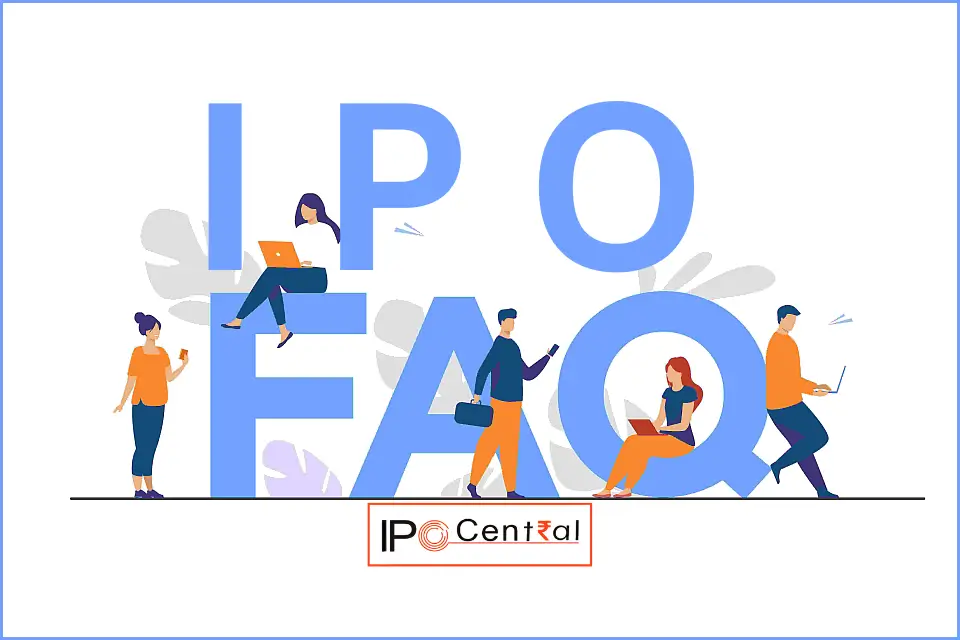IPO FAQs: What is an IPO?
This is one of the most common IPO queries. IPO full form is Initial Public Offering. As the name suggests, an IPO is the first offering of shares to general public. Prior to an IPO, shares might be offered to a different set of investors such as angel investors, venture capital firms and private equity players. Thus, this is the first time a company approaches folks like us for money.

1. Why are IPOs conducted?
IPOs are conducted to raise long-term capital. This capital can be used for various corporate needs like expanding operations, funding new projects, reducing debt, or acquiring other businesses. Unlike loans, funds raised through IPOs don’t need to be repaid with interest, making them a cost-effective way to fuel growth and gain market visibility.
2. Who can invest in IPOs?
Another common fixture in IPO FAQs. All Indian nationals who are competent to contract under the Indian Contract Act, 1872, in single or joint names. Ok, in simple terms it means that any citizen of the country, aged 18 years or more, with a sound mind is eligible to contract, provided he/she is not disqualified from contracting by any other law. What this means is that most people with no police or criminal investigations going against them are safe.
One needs a valid PAN (Permanent Account Number) and bank account can invest in IPOs. Parents of minors can also apply on the behalf of their kids under a guardianship account opened for the benefit of a minor. It is important to note that all applicants need to have demat account for applying to IPOs. Opening a demat account is now a completely online process and several companies waive off account opening charges. Investors can also take advantage of Basic Services Demat Account (BSDA) in case trading volumes are low.
3. What is a lot size / market lot?
Lot size refers to the minimum number of shares that an investor can apply for in an IPO. For example, if the lot size is 50, investors must apply for at least 50 shares or in multiples thereof. Market lot ensures uniformity in bidding and simplifies the allotment process.
4. What is IPO Price Band?
The IPO price band is the range within which investors can bid for shares in a book-building IPO. The lower end is called the floor price and the higher end is the cap price. The final offer price is decided based on demand and bids received during the subscription period.
5. What is Issue Size?
Issue size is the total value of shares a company plans to raise through an IPO. It is calculated by multiplying the number of shares issued by the offer price. For example, if a company issues 1 crore shares at INR 100 each, the issue size will be INR 100 crore.
6. What are the different types of IPOs?
Broadly, IPOs can be categorized in two types – Fixed price issue and Book-built issue
- Fixed Price – As the name suggests, fixed price issues have prices fixed by the company. Therefore, price of offer is known beforehand.
- Book-building – In book-building issues, the company offers a price range to investors and final price is discovered only after the bidding is over. The highest price where the company is able to sell all its shares is finalized as the offer price.
7. What is Cut-Off Price and Floor Price?
The cut-off price is the final price at which shares are allotted in a book-built IPO. Retail investors can choose “cut-off” while applying, indicating they’ll accept whatever final price is set. The floor price is the minimum bid price within the price band that investors can offer during bidding.
8. What is ASBA (Application Supported by Blocked Amount)?
This is an application mechanism which completely eliminates the need for refunds in the case of partial allotment and no allotment. ASBA allows the investors money to remain with the bank till the shares are allotted after the IPO. The funds are transferred after the allotment and to the extent of allotted shares. Initially, QIBs were not allowed to participate in IPOs through ASBA facility; however, with effect from May 2010, investors in all categories can apply through ASBA.
It is important to note that all banks do not offer this facility. A list of Self Certified Syndicate Banks (SCSBs), which is updated regularly, can be found on SEBI website. As on April 2022, there are 60 banks registered with SEBI to act as SCSBs.
To get more details about this feature and how you can benefit from it, visit our Online ASBA FAQ page.
9. What is GMP (Grey Market Premium) and Kostak?
Before an issue lists, trading activity may start in the informal market and both these terms are important benchmarks in the grey market. In grey market trades, shares allotted to IPO applications are sold by brokers without actually transferring the securities to their own accounts. The market is typically driven by high net-worth individual (HNI) investors who direct brokers to purchase applications from investors at a price which is called Kostak. IPO investors who sell their applications at kostak rates are not bothered about the allotment as kostak is not dependent on successful allotment.
GMP stands for Grey Market Premium and it indicates the premium per share on which IPO trades happen in the informal market. IPO GMP is the amount per share which an investor gets from the broker or individual who buy them before listing of the shares which might get allotted in the application.
To get issue-specific IPO grey market and kostak rates, please check out our IPO grey market and discussion section. The idea behind this page is to get most IPO FAQs answered but if you have more questions, feel free to ask in comments and we will do our best to answer the same as soon as possible. In fact, we will be happy to include such questions in this page on IPO FAQs.
10. What is the minimum bidding period for a book-built IPO?
According to SEBI guidelines, a book-built IPO must remain open for at least three working days. This window allows investors enough time to evaluate the offer, analyze company fundamentals, and submit or revise their bids. The bidding period may be extended depending on market response or regulatory decisions.
11. Who are Anchor Investors?
Anchor investors are Qualified Institutional Buyers (QIBs) who are allotted shares a day before the IPO opens to the public. Their early investment builds confidence in the issue and helps attract retail and other investors. Up to 60% of the QIB portion can be allocated to anchor investors, including mutual funds.
12. What are the categories in which IPO allotment applications can be made?
- RII (Retail Individual Investor): Investors applying for up to INR 2 lakh.
- NII (Non-Institutional Investor): High-net-worth individuals applying for over INR 2 lakh.
- QIB (Qualified Institutional Buyer): Institutional entities like mutual funds, banks.
Each category has a reserved quota, and investors must apply under their respective categories.
13. Where to check IPO application and allotment status?
You can check IPO status on the registrar’s website (such as Link Intime or KFintech) by entering your PAN or application number. Alternatively, stock exchanges like NSE and BSE also offer allotment status tracking. The information is updated shortly after finalization of basis of allotment.
14. Can a bidder revise or cancel IPO applications?
Yes, IPO applications can be modified or canceled before the issue closes. Investors can use a revision form (in offline mode) or revise bids through online platforms of brokers or banks. You can change bid quantity, price, or even cancel the application entirely within the bidding period.
15. How is IPO listing price decided?
The listing price of an IPO is decided by market forces on the day the shares are listed on the stock exchange. It depends on demand, overall market sentiment, and investor perception of the company. The price may be above or below the issue price depending on investor enthusiasm.
16. Can I make more than one IPO application?
Only one IPO application is allowed per PAN number. Submitting multiple applications under the same PAN will lead to rejection of all such applications. However, multiple applications from the same bank account are permitted if each application is linked to a unique PAN, such as for family members.



































GOOD!
Can I submit more than one application through ASBA? Like the 2 lakh limit , can split into two application, each for one lakh?
Not under the same PAN, both applications will stand cancelled. You can ofcourse put separate applications through the same bank account for different PANs.
Whats the best practice for how to apply for an ipo to maximize the probability of allotment.
Reliance Nippon ipo what is your advice loss or profit earning
Mr. Bagra,
If I apply for an IPO with > 2Laksh limit, I automatically become an NII investor. Is it true that SEBI IPO rules deny NII’s from revising their bids downwards or cancelling them even though within the IPO window? And apparently, the bid can only be revised upwards, but not downwards/cancelled!
If the above true, is there a reason for SEBI to introduce the rule? I mean what is the point of having an IPO window, if an investor cannot revise his bid downwards/cancel his application should he change his mind? Please clarify.
sir
can we apply ipo from esaf small finance bank
Can I publish your resources on my website.
I will be mentioning your website for further details.